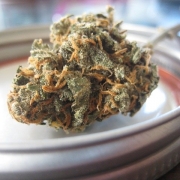No Correlation Between THC Levels In Blood And Psychomotor Impairment Per Study
The presence of low levels of THC in blood is poorly correlated with driving performance, according to driving simulator data published in the International Journal of Legal Medicine.
German investigators assessed simulated driving performance in 15 subjects following the consumption of up to three cannabis cigarettes. Subjects manifested changes in driving performance, such as higher incidences of weaving and an inability to compensate for unforeseen events, for a period of three hours following cannabis administration. After three hours, subjects’ “driving performance and style no longer differed significantly” from baseline performance, authors reported.
Researchers failed to identify any “reliable correlations” in the total quantity of cannabis consumed by participants and their THC blood concentrations immediately afterward, indicating “a considerable variation” in THC’s bioavailability.
Authors also failed to report any reliable relationship between drivers’ THC levels and performance. They concluded: “Consistent with previous studies, a direct correlation between the individual fitness to drive (amount of penalty points) and the THC concentrations … was not found. Therefore, determining a threshold limit for legal purposes based on these values alone seems to be arbitrary.”









